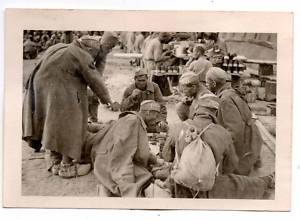AUTH PHOTO SMOLENSK KATYN MASSACRE NAZI GERMAN POW CAMP , vendido en Agosto 2010, ¡Por 16.5 US$!
¿Cansado de perder subastas en el último segundo?
Date de alta en Keecua.com y consigue artículos como éste al mínimo precio gracias a las pujas de último segundo de Keecua.com, con Keecua.com conseguirás los mejores precios en eBay y evitarás subastas fraudulentas.
Seller assumes all responsibility for this listing.Item specificsCondition: Used: An item that has been used previously. See the seller’s listing for full details and description of ... Read moreabout the conditionNew or Used: UsedHistory Era: WW IIOriginal/Reproducton: Original
SMOLENSK KATYN MASSACRE BUT NAZI POW CAMP
Authentic private photo (I do not sell copies, this is a original view in the time, and not copied trough media or history books)
Very rare historical photo taken by a Nazi German Camp Soldier/Officer
RUSSIAN PRISONERS IN A POW CAMP OF NAZI GERMANY IN SMOLENSK
2.5 x 3.5 inch (Very sharp photo though, it can be scanned and enlarged enormous)
During World War II, Smolensk once again saw wide-scale fighting during the first Battle of Smolensk when the city was captured by the Germans on July 16, 1941. The first Soviet counteroffensive against the German army was launched in August 1941 but failed. However, the limited Soviet victories outside the city halted the German advance for a crucial two months, granting time to Moscow's defenders to prepare in earnest. But the Germans stayed and took over POW camps, putting Russians in the camps (This photo).
The Germans had nothing to do with the Katyn Massacre of the Smolensk Camps of the POW’s who suddenly stopped writing in April of 1940.
The Soviet claim that the prisoners were murdered by the Nazis in August-September of 1941, after their occupation of the Smolensk area, is difficult to square with the fact that the Soviet Government- until the German announcement of the discovery of the mass graves in April 1943-refused to give any explanation or any information concerning the disappearance of the 15,000 Polish POW's to the representatives of the Polish Government in exile. Had the three POW camps in question been taken over by the Nazis, it should have been the simplest thing in the world for Moscow to tell General Sikorsky that it had no knowledge of the fate of the 15,000 Polish POW'S because they had all fallen into Nazi custody. This Moscow did not do.
The International Commission and the Polish Red Cross Commission, in examining almost 1,000 bodies, found no diary entries, letters, or other documents that bore dates after April 1940. The Nazi Government requested an investigation by the Inter- national Red Cross. The International Red Cross agreed, and well..
--




